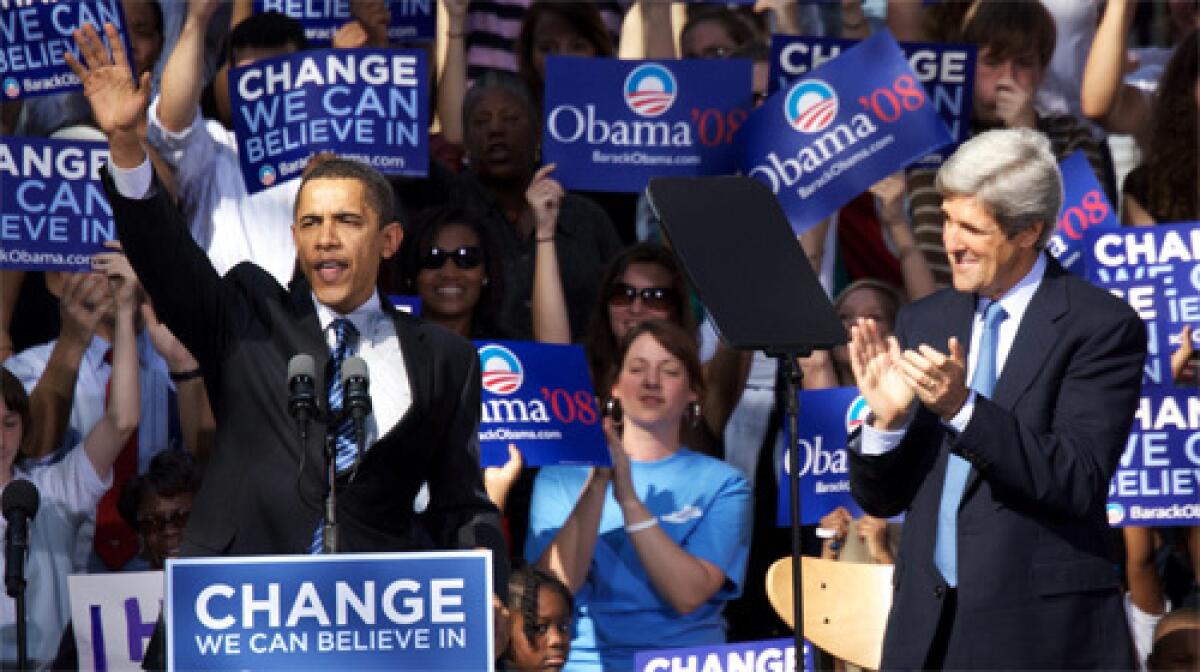Democrats hit the trail again, with friends

CHARLESTON, S.C. — The two leading Democratic presidential contenders revved up their campaigns Thursday, rallying supporters in upcoming battleground states and touting big-name endorsements.
Sen. Barack Obama (D-Ill.) won what was easily the day’s top prize -- the backing of Massachusetts Sen. John F. Kerry, the party’s 2004 nominee. Kerry announced his support during a surprise appearance with Obama in South Carolina, where Democrats cast primary ballots Jan. 26.
Sen. Hillary Rodham Clinton (D-N.Y.) spent the afternoon and evening campaigning in Nevada, whose Jan. 19 caucuses will be the next important Democratic contest. She snared an influential endorsement of her own -- Henry G. Cisneros, the first Latino secretary of Housing and Urban Development.
Cisneros, who served in her husband’s administration, had supported New Mexico Gov. Bill Richardson for the Democratic nomination. But he switched alliances Thursday after Richardson made official his decision to quit the race.
Cisneros, who also was mayor of San Antonio, could help Clinton’s campaign attract the support of Latinos in states like Nevada and California, where they are an important segment of the voting population.
For Obama and Clinton, who each came away with a victory in the first two Democratic contests, Thursday marked a resumption of retail politicking. A blitz of campaigning, crisscrossing the country, is expected to continue through Feb. 5, when 24 states conduct nomination contests.
Speaking from the picturesque steps of the Cistern Yard at the College of Charleston, Kerry said he believed that “more than anyone else, Barack Obama can help our country turn the page and get America moving by uniting and ending the divisions that we have faced.”
The endorsement was in part a snub of former North Carolina Sen. John Edwards, Kerry’s running mate in 2004. Edwards, who was born in South Carolina, will launch a three-day bus tour of the state today and needs a win after finishing second in Iowa and a fairly distant third in New Hampshire.
Kerry’s rejection of Edwards came as little surprise to political observers, who noted the friction between the two in 2004. Kerry aides have contended that Edwards never adapted to playing a No. 2 role and deferring to the head of the ticket.
Still, said Democratic political consultant Bill Carrick, Kerry’s is one of three endorsements the candidates would most covet -- the others being those of former Vice President Al Gore and Kerry’s fellow Massachusetts senator, Edward M. Kennedy.
Though Kerry may not be particularly popular among conservatives, Carrick said, he has a strong appeal to many Democrats. “He can play a unique role,” Carrick said. “Millions and millions and millions of Democrats voted for him the last time.”
The crowd at the Charleston rally was largely young and white, but with a noticeable number of black and middle-age supporters. Political strategists say African Americans are the key Democratic voting bloc in South Carolina, making up half of the party’s electorate. South Carolina will be the first primary state with a sizable number of black voters.
Some African American women who attended Obama’s rally said they felt torn between the Democratic front-runners, but had decided to choose youth over experience.
Irma Greene, 78, said Obama reminded her of John F. Kennedy. “President Kennedy was young, and this young man needs a chance,” said Greene. “We love Hillary, but we need Obama now.”
Clinton appeared at a Las Vegas forum on the home foreclosure crisis, held at a Mexican restaurant so packed that some people were turned away. She proposed that no one in the country be foreclosed on for 90 days, and called for a five-year freeze on interest rates and for more transparency in the mortgage industry.
The senator also spent 90 minutes going door-to-door in a predominantly Latino, working-class neighborhood. Residents asked Clinton was asked about foreclosures, healthcare, immigration, the war in Iraq and the economy; she had a lengthy chat with one man in his living room.
Jose Reyes, 25, a clothing store manager, greeted the senator in his frontyard, his home lined with Christmas lights. He had been leaning toward Obama, but was impressed that Clinton acknowledged the foreclosure problem.
“It was what I wanted to hear -- just that she understands about the fraud and the bad people,” Reyes said.
Reynolds reported from Charleston and Powers from Las Vegas. Times staff writers James Rainey and Stuart Silverstein in Los Angeles contributed to this report.
More to Read
Sign up for Essential California
The most important California stories and recommendations in your inbox every morning.
You may occasionally receive promotional content from the Los Angeles Times.










